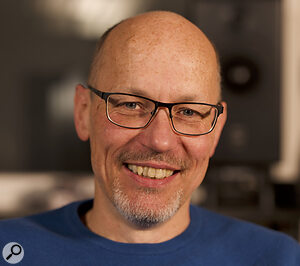Ask anyone in the know about trends in music technology, and the reply will probably contain the word ‘democratised’. DAW software has democratised music recording. Affordable analogue synths have democratised electronic music. Streaming has democratised music distribution. And so on.
Dig deeper and things become more complicated — if the music industry is so d Sam Inglis, SOS Editor In Chief.Photo: J.G. Hardingemocratic, why are so many successful artists privately educated? — but the general pattern is clear, and clearest of all in the world of orchestral music. Thirty years ago, the idea that anyone with a computer would be able to create plausible recordings of symphonic music would have seemed laughable. Today, schools up and down the land make the tools available to their students for free.
Sam Inglis, SOS Editor In Chief.Photo: J.G. Hardingemocratic, why are so many successful artists privately educated? — but the general pattern is clear, and clearest of all in the world of orchestral music. Thirty years ago, the idea that anyone with a computer would be able to create plausible recordings of symphonic music would have seemed laughable. Today, schools up and down the land make the tools available to their students for free.
This can be seen as the latest stage in a long process of making classical music more accessible to audiences and participants. Developers of orchestral sample instruments are picking up an educational baton passed down through Henry Wood’s Promenade Concerts, the El Sistema movement and countless other projects. And they are running with it. Spitfire Audio and VSL, for example, have invested heavily in their respective Academies, EastWest have produced a huge library of video tutorials, and Orchestral Tools have formed an ambitious partnership with Berklee College.
For the first time ever, it’s possible to compose for the orchestra entirely by ear.
Yet one of the key aspects of this democratisation is that education is optional. For the first time ever, it’s possible to compose for the orchestra entirely by ear. Play in your string parts from a keyboard. Arrange your brass on a step sequencer. Garnish the whole with ostinatos from a library of phrase‑based samples. If the results sound good, why not?
Perhaps, some would argue, because this is not democratisation but dumbing down. If anyone can now compose for orchestra just by stabbing at a keyboard, aren’t we undermining the very thing we’re supposed to be democratising?
The accessibility of sample libraries undoubtedly means that lots of bad ‘orchestral’ music is being made. But that’s just because so much more orchestral music is being made, full stop. What matters is that some of the people who encounter these tools will be inspired to seek out an education, while others will use them to do things that simply won’t have occurred to those who’ve learned composition the old‑fashioned way. And that, surely, is what democratisation is all about.
Sound On Sound is for experienced composers and newcomers alike, and this issue is a case in point. Dave Stewart’s extensive round‑up of orchestral sample libraries will be indispensable to those trying to make sense of the dizzying array of products available, while elsewhere, we show you how those tools enable absolutely anyone to create powerful and convincing orchestral pieces. Vive la democratie!
Sam Inglis Editor In Chief

